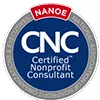Navigating Adversity and Building Resiliency in Nonprofit Organizations
Nonprofit organizations are unsung heroes of our communities, often serving the most vulnerable populations and addressing critical societal issues. However, these organizations are not immune to challenges. From funding uncertainties to staffing shortages, nonprofits must navigate numerous obstacles to achieve their missions. Despite these challenges, many nonprofits not only survive but thrive, demonstrating incredible resilience and adaptability.
Here’s how we can work together to strengthen your organizational resiliency.
Embrace a Mission-Driven Mindset
At the heart of every resilient nonprofit is a clear and compelling mission. This mission serves as a north star, guiding decision-making and inspiring staff, volunteers, and supporters. During times of adversity, a strong mission can help an organization stay focused and motivated. It reminds everyone involved why they do what they do and who they are doing it for. Regularly revisiting and reaffirming this mission can reinforce commitment and resilience.
Foster a Culture of Adaptability
Resilient nonprofits are adaptable. They are willing to pivot and change strategies in response to new challenges or opportunities. This requires a culture that encourages innovation and flexibility. Nonprofits can foster such a culture by promoting open communication, encouraging staff to propose new ideas, and being willing to take calculated risks. Flexibility in programming, operations, and funding approaches can help nonprofits stay relevant and effective, even in changing circumstances.
Invest in Capacity Building
This means investing in staff development, improving operational systems, and enhancing financial management practices. Well-trained and supported staff are more capable of navigating challenges and seizing opportunities. Strong systems and processes ensure that the organization can operate efficiently and effectively, even under pressure. Nonprofits should prioritize continuous learning and improvement to build their capacity and resilience.
Strengthen Community Relationships
Nonprofits should actively engage with stakeholders, including clients, volunteers, donors, and partners. Building and maintaining these relationships requires regular communication, collaboration, and mutual support. When adversity strikes, a strong community network can offer resources, advocacy, and moral support, helping the nonprofit to weather the storm.
Diversify Funding Sources
Nonprofits should aim to diversify their funding sources to reduce dependency on any single stream of income. This can include a mix of grants, donations, earned income, and fundraising events. By diversifying their funding portfolio, nonprofits can better withstand financial shocks and uncertainties. Additionally, building an emergency fund or reserve can provide a financial cushion in times of crisis.
Transparency and Accountability
Transparency and accountability build trust and credibility, both of which are essential for resilience. Nonprofits should be transparent about their challenges and successes with their stakeholders. This openness can foster a sense of shared responsibility and encourage support from the community. Additionally, being accountable for their actions and decisions helps nonprofits maintain integrity and trust, which are crucial for long-term sustainability.
Cultivate a Resilient Leadership
Leaders should demonstrate adaptability, empathy, and decisiveness. They must be able to make tough decisions, communicate effectively, and inspire confidence in their team. Investing in leadership development can help ensure that the organization's leaders are well-equipped to navigate challenges and lead the organization toward success.
Focus on Mental Health and Well-being


